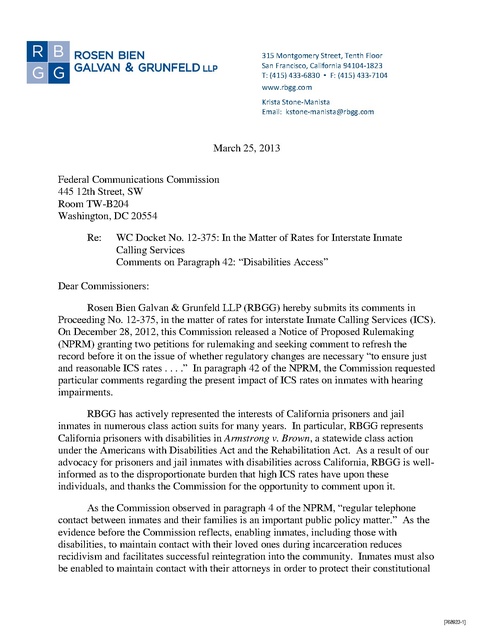Rbgg Comment on Wright Petition Phone Justice 2013
Download original document:

Document text

Document text
This text is machine-read, and may contain errors. Check the original document to verify accuracy.
315 Montgomery Street, Tenth Floor San Francisco, California 94104-1823 T: (415) 433-6830 ▪ F: (415) 433-7104 www.rbgg.com Krista Stone-Manista Email: kstone-manista@rbgg.com March 25, 2013 Federal Communications Commission 445 12th Street, SW Room TW-B204 Washington, DC 20554 Re: WC Docket No. 12-375: In the Matter of Rates for Interstate Inmate Calling Services Comments on Paragraph 42: “Disabilities Access” Dear Commissioners: Rosen Bien Galvan & Grunfeld LLP (RBGG) hereby submits its comments in Proceeding No. 12-375, in the matter of rates for interstate Inmate Calling Services (ICS). On December 28, 2012, this Commission released a Notice of Proposed Rulemaking (NPRM) granting two petitions for rulemaking and seeking comment to refresh the record before it on the issue of whether regulatory changes are necessary “to ensure just and reasonable ICS rates . . . .” In paragraph 42 of the NPRM, the Commission requested particular comments regarding the present impact of ICS rates on inmates with hearing impairments. RBGG has actively represented the interests of California prisoners and jail inmates in numerous class action suits for many years. In particular, RBGG represents California prisoners with disabilities in Armstrong v. Brown, a statewide class action under the Americans with Disabilities Act and the Rehabilitation Act. As a result of our advocacy for prisoners and jail inmates with disabilities across California, RBGG is wellinformed as to the disproportionate burden that high ICS rates have upon these individuals, and thanks the Commission for the opportunity to comment upon it. As the Commission observed in paragraph 4 of the NPRM, “regular telephone contact between inmates and their families is an important public policy matter.” As the evidence before the Commission reflects, enabling inmates, including those with disabilities, to maintain contact with their loved ones during incarceration reduces recidivism and facilitates successful reintegration into the community. Inmates must also be enabled to maintain contact with their attorneys in order to protect their constitutional [768923-1] Federal Communications Commission March 25, 2013 Page 2 and statutory rights. Unfortunately, most California prisons allow Deaf and hearingimpaired inmates only limited access to outdated and poorly maintained TDD/TTY machines. As a result, Deaf and hearing-impaired persons cannot communicate with family, friends and counsel on anything like an even basis with other persons. A practical and cost-effective solution is to provide inmates with access to videophone technology in addition to use of TDD/TTY machines. This would both dramatically decrease the disproportionate cost burden associated with use of TDD/TTY technology and would greatly facilitate communication between Deaf and hard-of-hearing inmates and other individuals who use American Sign Language rather than written English. RBGG is engaged in active advocacy efforts to improve access to videophone technology in California prisons and jails. In the interim, however, inmates are reliant upon often cost-prohibitive use of TDD/TTY machines. RBGG urges the Commission to adopt the following new regulations regarding ICS provision to Deaf and hard-of-hearing inmates in order to mitigate the burdens placed upon them by current rate-setting practice. 1. ICS Rates Must Account for the Extra Time Necessary to Complete a TDD/TTY Call Deaf and hard-of-hearing inmates are particularly harmed by the exorbitant ICS calling rates identified in the NPRM for two reasons. First, conversations held using TDD/TTY machines, or using relay services, take significantly more time than voice calls. Because ICS generally charge on a per-minute basis, Deaf and hard-of-hearing prisoners must pay significantly more than other inmates to conduct similar conversations. A call placed using a TDD/TTY devices can take several times longer than an identical voice call. Current ICS rates do not account for this disparity, which unfairly discriminates against inmates restricted to use of TDD/TTY devices. RBGG therefore urges the Commission to adopt regulations requiring ICS providers to discount their rates for inmates placing calls using TDD/TTY devices. 2. ICS Providers Must Account for Inmates’ Limited Access to TDD/TTY Devices Deaf and hard-of-hearing inmates are also disproportionately burdened by the relative rates charged by ICS providers for daytime telephone usage as opposed to night and weekend usage. Where hearing inmates may often access a telephone at any time, and thus take advantage of ICS night and weekend discounts, Deaf and hard-of-hearing inmates must generally use a TDD/TTY machine that is only available at the convenience of prison staff during regular working hours. Deaf and hard-of-hearing inmates thus not [768923-1] Federal Communications Commission March 25, 2013 Page 3 only have fewer opportunities to contact their loved ones, but do not have the ability to take advantage of cheaper ICS rates during off-hours. RBGG asks the Commission to adopt a regulation requiring ICS providers to charge only their lowest per-minute cost to users of TDD/TTY devices, regardless of the time at which calls using such devices are placed. 3. ICS Providers Must Permit the Use of Relay Services Many Deaf and hard-of-hearing inmates cannot communicate using TDD/TTY devices, which require a degree of literacy in standard written English, because either the inmate or his family member lacks such proficiency. Increasingly widespread use of relay services has ameliorated this difficulty for many Deaf families, but this technology is generally not available to inmate callers because prisons and jails block access to tollfree numbers without exception for relay numbers. Even in prisons where a relay service may be called, the additional fees charged by ICS providers for use of a relay provider often make doing so prohibitively expensive. The Commission should adopt regulations requiring that ICS providers facilitate access to relay services and prohibiting them from imposing additional fees for connecting to relay operators, as envisioned by section 276(b)(1)(A). Thank you for your consideration of this important issue. Sincerely, ROSEN BIEN GALVAN & GRUNFELD LLP By: Krista Stone-Manista KSM:KSM [768923-1]





